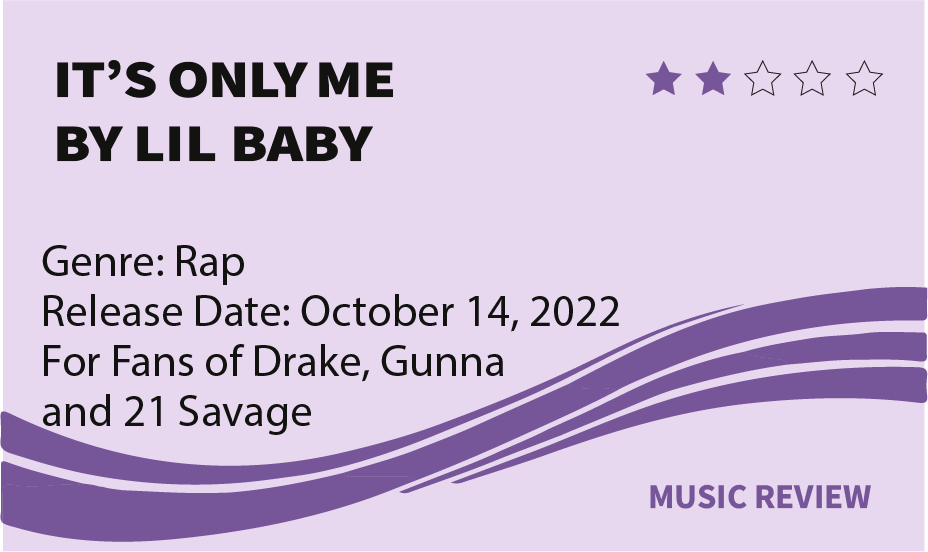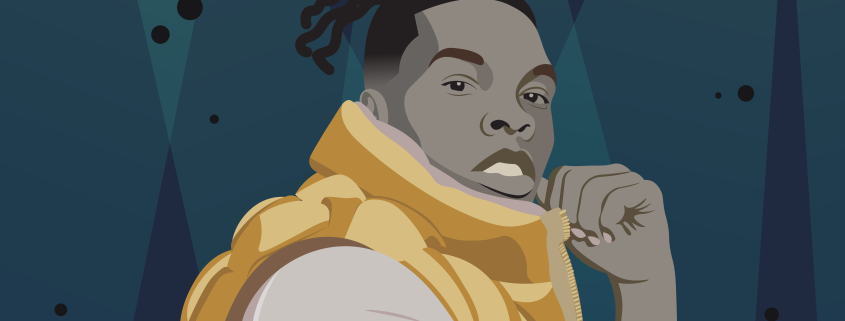‘It’s Only Me’ is rap’s biggest letdown


It’s been two years since Lil Baby’s last project. On Oct. 14, the rapper released the most anticipated album of his career. “It’s Only Me,” a 23-track album, comes with predictable and expected flows. Despite features from some of the most noticeable names in the genre such as Future, Young Thug and Pooh Shiesty, the album still fails to truly provide that “Lil Baby” sound fans are used to hearing.
Lil Baby’s 2020 album, titled “My Turn,” set the bar high for fans in terms of quality and playability. “My Turn” had not only GRAMMY-nominated tracks, but also an extensive track list with songs that are still in heavy rotation today like “Sum 2 Prove” and “We Paid.” “My Turn” set the tone for the impact that Lil Baby could have in the rap genre.
Even though he’s a staple in current rap, the goal behind “It’s Only Me” was to create enough traction so Lil Baby could etch his name with the likes of greats like Lil Wayne, Drake and Kanye West. “It’s Only Me” was meant to elevate Lil Baby’s status as a great rapper from the 2020s to a true generational talent. But despite being a decent album, “It’s Only Me” will go down as a rare miss for the Atlanta rapper.
“It’s Only Me” not only suffers from rough transitions, but also from how rushed the project seems. Despite being announced in early September with the arrival of track “Detox,” the content on “It’s Only Me” feels like an essay started and finished the night before it was due. Although “It’s Only Me,” for the most part, is not the Lil Baby fans know and love, there are a few tracks that do have the reliability factor to them.
Tracks like “California Breeze” show his ability to float on a beat with unique flows. The song reminds the listener of what Lil Baby is truly capable of — the melodic flow he uses throughout the track is what garnered him praise in the first place. However, this flow is specific only to “California Breeze,” and it’s a shame that we don’t hear it throughout the rest of the album.
One of the best features on the album comes from “Back in Blood” rapper Pooh Shiesty. The pair connect on the track “Shiest Talk,” where Pooh Shiesty blends his heavily influenced Memphis style with Lil Baby’s Atlanta flow. Although sounding lazy throughout the track, Pooh Shiesty makes his lyrics pair perfectly with the piano playing in the background.
Another ingenious collaboration comes in the form of “Never Hating.” Lil Baby and Young Thug team up to deliver brilliant lyrics over a classic Southern trap beat. Despite creating an almost perfect chorus, Lil Baby gives enough creative space to Young Thug to make “Never Hating” sound more like a collaboration than a feature. Young Thug uses his classic high-pitched sound to imitate the flow created by Lil Baby in the chorus and his prior verses.
Contrarily, “Pop Out,” is one of the album’s lowlights with a rushed and unfinished feel to it. This attempt by Lil Baby to be spontaneous with the introduction of the feature, Nardo Wick, makes the song sound incomplete. Nardo Wick is introduced by a sloppy and abrupt beat change, making “Pop Out” sound like two completely different songs. Not to say the song itself is terrible, but the transition introducing Nardo Wick is far from pleasing.
“Forever” is another showcasing of Baby not putting his best foot forward. The track features Fridayy, an artist most known for his chorus on “GOD DID.” From the start of the track, this song feels like a forced attempt at creating a sad but groovy track. “Forever” resembles songs like “WAIT FOR U’’ by Future and “Chicago Freestyle’’ by Drake, but fails to fully capture this sound, leaving the listener underwhelmed by Lil Baby’s lyrics and flow. With fans being aware of Lil Baby’s lyrical ability, “Forever” not only lets fans down but leaves them wondering if this was just a lazy attempt by the rapper to add another song to the tracklist.
Overall, “It’s Only Me” did not meet anyone’s expectations. Despite the 23-song track list, Lil Baby failed to captivate his audience. Out of the 23 tracks, there’s most likely a solid three songs that will be saved and added to a daily playlist. While it’s important to remember that Lil Baby is an artist and art is subjective, the disappointment surfacing this album does not discredit Lil Baby’s past accomplishments. But, hopefully in the future, Lil Baby is able to release something with a little more creativity added to the concept of the album.

